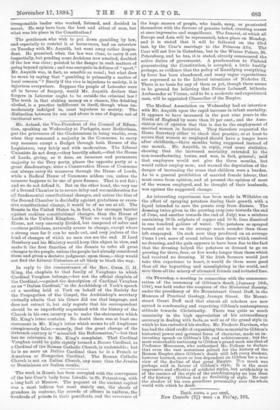On Thursday, a meeting in connection with the commemo- ration
of the centenary of Gibbon's death [January 16th, 1794], was held under the auspices of the Historical Society, under the presidency of Sir Mountstnart Grant Duff, in the Museum of Practical Geology, Jermyn Street. Sir Mount- stuart Grant Duff said that almost all scholars are now agreed in condemning and regretting Gibbon's contemptuous attitude towards Christianity. There was quite as much. unanimity in the high appreciation of his extraordinary accuracy in dealing with facts, as well as of the grand style in which he has embodied his studies. Mr. Frederic Harrison, who has had the chief credit of organising this memorial to Gibbon's historical power and nersonal force of character, made an in- teresting speech on Gibbon's life and achievements; but the most remarkable testimony to Gibbon's grand work was that of Professor Mommsen, who authorised Mr. Pelham to declare that even the vast accessions gained for the history of the Roman Empire since Gibbon's death still left every student, however learned, more or less dependent on Gibbon for a true view of the decline of that great Empire. Teo much was perhaps said in favour of Gibbon's style. It is the most impressive and effective of artificial styles, but artificiality is of the essence of the style of the autobiography no leas than of the history. Gibbon had no flexibility of style. He cast , the shadow of his own grandiose personality over the whole world with which he dealt.


















































 Previous page
Previous page